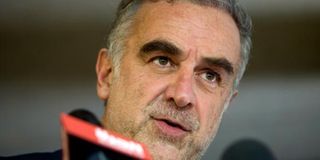Ocampo opposes plan for ICC hearings in Kenya

Photo/FILE
ICC Chief Prosecutor Luis Moreno-Ocampo argues that security conditions make it impossible to conduct the hearing in Kenya.
International Criminal Court Prosecutor Luis Moreno-Ocampo has opposed the suggestion by the Pre-Trial Chamber II that hearings scheduled for September be held in Kenya.
The Prosecutor argues that security conditions make it impossible to conduct the hearing in Kenya.
“It is impossible to assume that the Government of Kenya will provide the essential cooperation and substantial protection to enable an effective continuation of the hearings in situ (in its place),” said Mr Moreno-Ocampo.
Post-election violence victims through the Office of Public Counsel for Victims also expressed opposition to the plan arguing that holding the confirmation of charges hearing in Kenya could increase the danger of an outbreak of violence.
“The Pre-Trial Chamber’s initiative in considering holding the confirmation hearings as close as possible to the affected communities is greatly appreciated by the victim applicants.
“The unfortunate reality, however, is that such hearings would not be in the interests of justice given current circumstances,” the victims said.
The Prosecutor and the victims made the observations as the Ocampo Six presented varied observations over the issue.
Former Industrialisation minister Henry Kosgey welcomed the suggestion but argued that “it is desirable and in the interest of justice to conduct confirmation of charges hearings in Kenya.”
He added that it is in the interests of justice that the hearing be conducted within Kenya to enable him mount “an affordable, proportionate and efficient defence.”
Former police boss Hussein Ali told the judges that he wants the ICC trial to proceed at The Hague, but wants a status conference held by all parties to discuss holding hearings in Kenya.
Head of civil service Francis Muthaura also expressed reservations to holding the hearings in Kenya arguing that unless the Court and the Government are able to adequately provide for the safety and security of the victims and witnesses, and ensure proper and orderly conduct of proceedings he would not support the move.
“Therefore, the defence invites the Court to consider Arusha as the next best alternative to Kenya, in view of the concerns raised by the Defence and which may render the conduct of the confirmation of charges hearing in Kenya not feasible,” said Mr Muthaura.
Eldoret North MP William Ruto and radio presenter Joshua Sang argued that relocating ICC proceedings to Kenya could also create an erroneous perception of the Government and make it seem as if the admissibility case had been predetermined.
Parties in the Kenyan cases had until Monday evening to give the ICC judges their ideas on “the desirability and feasibility of conducting the confirmation of charges hearings” in the country.
The prosecutor expressed concern that the government of Kenya was unlikely to give the ICC full cooperation given that it is already challenging the cases through an admissibility case which is currently at the Appeals Chamber.
“The Prosecution reminds the Chamber that it is currently refusing to share its confidential information with the Government of Kenya because of concerns that the State will be unable to protect it, and it is also arguing to this Chamber that materials in the possession of the Court should also be withheld at this time,” said Mr Moreno-Ocampo.
Meanwhile, the Appeals Chamber has asked parties to the Kenyan cases at The Hague to make submissions on the government’s appeal to a decision throwing out its admissibility challenge case.
The five-judge bench decided on Monday to allow the different parties to make observations on the appeal document filed by the Kenyan Government.
“The responses shall be filed within seven days of notification of that document,” the judges ruled.
The confirmation of charges hearings are to be held on September 1 for Mr Ruto, Mr Sang and Mr Kosgey, and on September 21 for Deputy Prime Minister Uhuru Kenyatta, Mr Muthaura and Mr Ali.
A confirmation of charges hearing is held to determine if there is sufficient evidence to believe a suspect committed the crimes he is charged with.
If the charges are confirmed, the Pre-Trial Chamber commits the person to a Trial Chamber, which conducts the next phase of the proceedings – the trial.
Mr Ruto’s lawyer Katwa Kigen has already written to the court demanding an explanation as to why the court wants to hold the hearings in Kenya.
The lawyer argues that there is possibility of unnecessary delays if the hearings are held locally.




